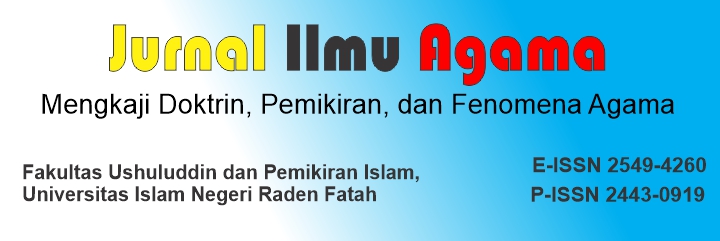Empirical Experience of the Prophet as a Source of Knowledge Hadith Perspective
Isi Artikel Utama
Abstrak
Empirisme adalah salah satu cabang epistemologi Barat yang berasaskan pengalaman dan mengecilkan akal. Menurut paham empirisme, sumber pengetahuan adalah pengalaman atau empirik. Akal bukan sebagai sumber pengetahuan; sebaliknya, akal ditugaskan untuk memproses pengetahuan yang diperoleh dari pengalaman. Tujuan penelitian ini untuk mengetahui hadis tentang kehidupan Nabi yang dapat merupakan epistemologi sebagai ilmu pengetahuan. Penelitian ini menggunakan metode deskriptif dengan kajian literatur. Dengan demikian, penelitian ini menyimpulkan bahwa penerapan epsitemologi Islam berdasarkan kehidupan Nabi terbukti dalam hadis riwayat muslim no. indeks 2336 tentang kisah Nabi yang salah kepada petani kurma. Hadis ini merupakan sebuah penghormatan terhadap Nabi karena kepakaran dan kemampuan dalam bidang profesi. Dengan bahasa lain, hadis Nabi menunjukkan bahwa yang lebih mengerti tentang masalah pertanian hanyalah para petani. Dilihat dari asbab al-wurud hadis, bahwa Nabi lahir dan dibesarkan di Jazirah Arab yang tandus. Oleh karenanya, Nabi hanya menyampaikan pendapat tanpa memiliki pengalaman dalam bertani kurma. Dari pengalaman atas kesalahan pendapat Nabi ini bisa dibuat pelajaran bagi para petani, sebagaimana yang lebih paham tentang dunia pesantren adalah kyai dan pengurus pesantren.
Rincian Artikel

Artikel ini berlisensi Creative Commons Attribution 4.0 International License.
Authors who publish with this journal agree to the following terms:
- Authors retain copyright and grant the journal right of first publication with the work simultaneously licensed under a Creative Commons Attribution 4.0 International License that allows others to share the work with an acknowledgement of the work's authorship and initial publication in this journal.
- Authors are able to enter into separate, additional contractual arrangements for the non-exclusive distribution of the journal's published version of the work (e.g., post it to an institutional repository or publish it in a book), with an acknowledgement of its initial publication in this journal.
- Authors are permitted and encouraged to post their work online (e.g., in institutional repositories or on their website) prior to and during the submission process, as it can lead to productive exchanges, as well as earlier and greater citation of published work.
Cara Mengutip
Referensi
Al-Habibi, Muhammad Luthfi Jalaludin. “Signifikasi Makna Kritisisme (Transdental) Dalam Filsafat Imanuel Kant: Studi Kasus Filsafat Modern.” Gunung Djati Conference Series 24 (2023): 705–17. https://conferences.uinsgd.ac.id/.
Anugrah, Meisakh Nur, and Usman Radiana. “Filsafat Rasionalisme Sebagai Dasar Ilmu Pengetahuan.” Jurnal Filsafat Indonesia 5, no. 3 (2022): 182–87. https://doi.org/10.23887/jfi.v5i3.41741.
Basuki, Samsul. “Bayani, Burhani Dan Irfani Trilogi Epistemologi Kegelisahan Seorang Muhammad Abid Al Jabiri.” Cakrawala Hukum XI, no. 1 (2015): 1–18. https://e-journal.unwiku.ac.id/hukum/index.php/CH/article/view/171.
Chatimah Asmad, Chusnul. “Teori Epistemologi Empirisme.” TESIS, UIN Alauddin Makassar. UIN Alauddin Makassar, 2018.
Drs. A. Susanto M.Pd. Filsafat Ilmu: Suatu Kajian Dalam Dimensi Ontologis, Epistemologis, Dan Aksiologis. Jakarta: PT Bumi Aksara, 2016.
Fithoroini, Dayan, and Muhammad Latif Mukti. “Hadis Nabi Yang Tekstual Dan Kontekstual Analisis Pemikiran Syuhudi Ismail.” Nabawi 2, no. 1 (2021): 116–40.
Hafizallah, Yandi, and Muhammad Abdul Wafa. “Pemikiran Muhammad Abed Al-Jabiri Terhadap Nalar Arab : Konsep Dan Relevansi.” Mawa’izh: Jurnal Dakwah Dan Pengembangan Sosial Kemanusiaan 10, no. 1 (2019): 60–76. https://doi.org/10.32923.
Hasyim, Mochamad. “Epistemologi Islam (Bayani, Burhani, Irfani).” Al-Murabbi 3, no. 2 (2018): 217–28. http://jurnal.yudharta.ac.id/v2/index.php/pai.
Ma’mun, Hakam Al. “Hubungan Epistemologi Keislaman Muhammad Abid Al-Jabiri Dengan Tipologi Penafsiran Al-Qur’an.” Journal of Islamic Civilization 3, no. 2 (2021): 135–48. https://doi.org/10.33086/jic.v3i2.2252.
Machmud, Tedy. “Rasionalisme Dan Empirisme Kontribusi Dan Dampaknya Pada Perkembangan Filsafat Matematika.” Jurnal Inovasi 8, no. 01 (2011): 113–24. http://ejurnal.ung.ac.id/index.php/JIN/article/view/752/695.
Masykur, Fuad. “Metode Dalam Mencari Pengetahuan: Sebuah Pendekatan Rasionalisme Empirisme Dan Metode Keilmuan.” Jurnal Tabawi 1, no. 2 (2019): 57–68. https://stai-binamadani.ejournal.id.
Na’im, Zaedun. “Epistimologi Islam Dalam Perspektif M. Abid Al Jabiri.” Jurnal Transformatif 5, no. 2 (2021): 163–76. https://doi.org/10.23971/tf.v5i2.2774.
Napitupulu, Dedi Sahputra, and Hasan Bakti Nasution. “Membenahi Pendidikan Islam: Sudut Pandang, Tradisi Dan Pengalaman.” Jurnal Reflektika 17, no. 2 (2022): 253–74.
Naysaburi, Muslim bin al Hajjaj Abu al Hasan al Qushayri al. Al-Musnad Al Sahih Al Mukhtasar Binaqli Al ’Adl Ila Rasulillah Salla Allah Alayhi Wasallam. Beirut: Dar Ahya al Turath al Arabiyyu, n.d.
Nur’aini, Siti. “Pemikiran Syuhudi Ismail Tentang Hadis Tekstual Dan Kontekstual.” Cendekia Inovatif Dan Berbudaya: Jurnal Ilmu Sosial Dan Humaniora 1, no. 1 (2023): 1–6. https://doi.org/10.59996/cendib.v1i1.145.
Nurhadi. “Debat Pemikiran Dan Pergulatan Filsafat Moderen.” Yasin 2, no. 3 (2022): 408–27. https://doi.org/10.58578/yasin.v2i3.480.
Pari, Fariz. “Epistemologi Dan Pengembangan Ilmu Pengetahuan.” Ilmu Ushuluddin 5, no. 2 (2018): 139–54. https://doi.org/10.15408/iu.v5i2.12781.
Rahman, Fadli, and Mahyuddin Barni. “Ilmu Dan Islam: Mengurai Konsep Dan Sumber Ilmu Dalam Al- Qur ’an Dan Hadis.” Nalar : Jurnal Peradaban Dan Pemikiran Islam Ilmu Dan Islam 5, no. 2 (2021): 121–29. https://doi.org/10.23971/njppi.v5i2.3821.
Rofik Fitrotulloh, Moh. “Konstruksi Filsafat Dan Agama Dalam Bingkai Peradaban Islam.” (PPBA) UIN Maliki Malang, n.d., 1–20.
Rokhmah, Dewi. “Ilmu Dalam Tinjauan Filsafat: Ontologi, Epistemologi, Dan Aksiologi.” CENDEKIA: Jurnal Studi Keislaman 7, no. 2 (2021): 172–86. https://ejurnal.staiha.ac.id/index.php/cendekia/article/view/124.
Saumantri, Theguh. “Metafisika Empirik Dalam Pemikiran David Hume.” JAQFI: Jurnal Aqidah Dan Filsafat Islam 7, no. 2 (2022): 231–44.
SE, M.Ak, Akt, Bahrum. “Ontologi, Epistemologi Dan Aksiologi.” Sulesana 8, no. 2 (2013): 35–45. https://himpunanmakalahcutroes.blogspot.com/2012/08/manusia-adalah-makhluk-pencari-kebenaran.html.
Siregar, Nasyariah. “Epistemologi Ahmed Al-Jabiri Dalam Pembelajaran Sains Madrasah Ibtidaiyah.” Primary Education Journal 1, no. 1 (2017): 1–10. http://pej.ftk.uinjambi.ac.id/index.php/PEJ/index%0APRIMARY.
Su’eb. “Ilmu Pengetahuan Dalam Perspektif Hadis Nabi.” Jurnal Al-Ibrah 6, no. 2 (2021): 73–89.
Sufiyana, Atika Zuhrotus, and Adi Sudrajat. “Sumber Filsafat Islam: Wahyu, Akal, dan Indera.” Jurnal Tinta 5, no. 1 (2023): 73–82.
Ulfah, Maria. “Mekanisme Perolehan Ilmu Dalam Perspektif Filsafat Pendidikan Islam.” Jurnal Ilmiah Didaktika 12, no. 2 (2012): 289–307. https://doi.org/10.22373/jid.v12i2.454.
Utami, Hesti Dwi Ira. “Pengalaman Dalam Epistemologi Empirisme Sebagai Sumber Ilmu Pengetahuan.” Filsafat, 2019.
Vera, Susanti, and R. Yuli A. Hambali. “Aliran Rasionalisme Dan Empirisme Dalam Kerangka Ilmu Pengetahuan.” Jurnal Penelitian Ilmu Ushuluddin 1, no. 2 (2021): 59–73. https://doi.org/10.15575/jpiu.12207.
Yetti, Salma, Azmi Fitrisia, and Ofianto Ofianto. “Analisis Aliran Filsafat Ilmu & Etika.” Ensiklopedia of Journal 5, no. 2 (2023): 1–8. https://doi.org/10.48175/ijarsct-13062.
